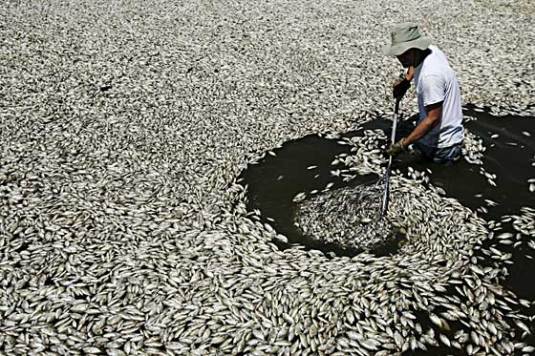
In a year that has seen the disastrous effects of climate change unfold with frightening speed — from drought and famine to heat domes, wildfires and deadly flash flooding — another potential catastrophe has come into view: depleted oxygen levels in the world’s oceans and lakes that threaten marine life.
Last summer, more than 100 miles of Florida’s coastal waters became an oxygen-depleted dead zone, littered with fish that could be seen even into Tampa Bay. On the other side of the country, Dungeness crabs were washing onto Oregon’s shoreline, unable to escape from water that has, in dramatic episodes, become seasonally depleted of oxygen over the past two decades.
Little is said about oxygen levels, particularly in oceans and lakes
In part due to the effects of rising global temperatures, growing portions of the oceans have lost “10-40% of their oxygen,” and that figure is forecast to continue growing.
Water without adequate oxygen cannot support life, and for the three billion people who depend on coastal fisheries for income, declining ocean oxygen levels are catastrophic.
Rising water temperatures and depleted oxygen, which pollution and nutrient runoff also make worse, have been blamed for mass die-offs of fish this year in states like Florida, California, Oregon, Montana, Louisiana, Virginia, Pennsylvania, Missouri, Washington, Idaho, Delaware and Minnesota.
When a heat dome covered much of the Pacific Northwest this summer, rising temperatures in streams and rivers resulted in mass die-offs of salmon and trout. An estimated 1 billion marine animals along the coast of Canada were also killed as a result of that heat wave.
Bodies of water can absorb CO2 and O2, but only to a temperature-dependent limit. Gas solubility decreases with warming temperatures; that is, warmer water holds less oxygen.
This decrease in oxygen content, coupled with a large-scale die-off of oxygen-generating phytoplankton resulting from plastic pollution and industrial run-off, compromises ecosystems, asphyxiating marine life and leading to further die-offs. Large swaths of the oceans have lost 10–40% of their oxygen.
With roughly 3 billion people worldwide who depend on fishing to make their living, sustaining oxygen levels in the world’s oceans and lakes is certain to be just one more challenge.
If we do not stop marine life from oxygen-starvation, we propagate a further travesty on ourselves. [Scientific American, Yahoo]
Now subscribe to this blog to get more amazing news curated just for you right in your inbox on a daily basis (here an example of our new newsletter).
You can also follow us on Facebook and/ or Twitter. And, by the way you can also make a donation through Paypal. Thank you!
You should really subscribe to QFiles. You will get very interesting information about strange events around the world.












